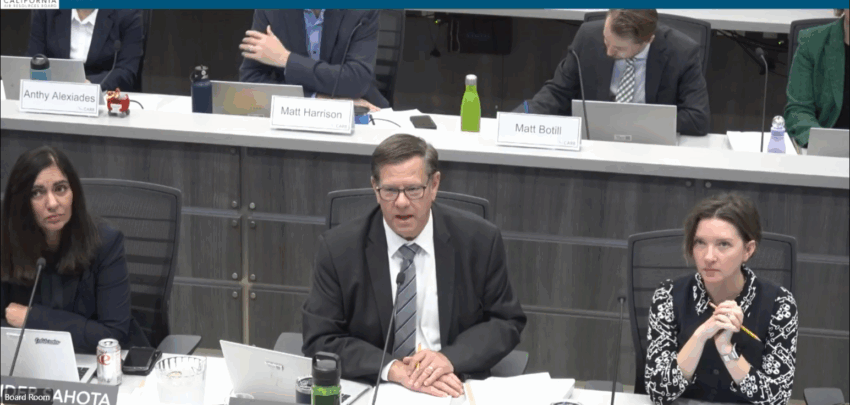After hours of emotional testimony and stark warnings Thursday, the California Air Resources Board updated its landfill-methane regulations to improve the detection of environmental problems and the transparency around how they’re reported. “Working to reduce harmful emissions across all sources, the California Air Resources Board today approved updates to its Landfill Methane Regulation that will enable quicker detection and repair of methane leaks at landfills, improve monitoring and reporting and facilitate stronger action for recurring issues,” according to the statement from CARB, which called methane emissions from landfills the state’s second-largest source of the pollutant. Santa Clarita Valley residents, some who attended virtually and others making the trip to Sacramento, talked about how the rules were needed in order to prevent another situation like the one at Chiquita Canyon Landfill. Over the past three years, experts have spent millions of dollars working to clean up problems with the facility that revolve around an underground fire burning trash daily at around 245 degrees. Chiquita’s underground reaction, which it refers to as an underground elevated temperature event, has tripled in size, and is now expected to burn for 20 years, according to a state lawmaker’s recent report. Jane Williams, executive director of California Communities Against Toxics, said one of her biggest concerns is that Chiquita is one of 11 landfills that the Environmental Protection Agency has permitted to operate, despite seeing temperatures in excess of 130 degrees, the EPA’s regulatory limit. “Our landfills are burning to the ground, and we need to do something about it,” Williams said in her public comment advocating for the new rules and calling for a unified response to what she referred to as a national crisis. In California, there are 299 municipal solid waste landfills releasing an estimated 22 million metric tons of carbon dioxide equivalent of methane in 2023, equal to the climate impact of 5. 1 million passenger vehicles driven for a year, according to a news release from Full Circle Future. Williams said she’s part of a group that believes Chiquita’s “event” is tied to its methane-extraction operations, which need to be closely monitored. There are combustible elements, especially in older landfills like Chiquita, and the pulling of gas can draw in oxygen at rates that can bring the combustion to dangerous levels. She’s an advocate for more recycling versus landfills, she’s said, but as there’s a great dependency on them, it’s critical that the monitoring component is there to prevent the other 10 landfills from reaching a Chiquita-level disaster for decades, she said. Castaic and Val Verde residents spoke about how Chiquita’s problems have torn the neighborhoods surrounding the landfill apart. One concern about the regulation stemmed from the potential cost, including to the operators of public landfills, which would put the cost of any new rules on the taxpayer, according to San Diego Mayor Todd Gloria. He asked the state agency to give him a better justification of his proposed cost of the new rules, which was estimated at around $57,000 for each facility. Quinn Langfitt, an air resources engineer for CARB, explained the figure as an average, for all landfills. Assemblywoman Pilar Schiavo, D-Chatsworth, who’s working on legislation, Assembly Bill 28, inspired by Chiquita’s problems, said the landfill is now spending millions of dollars to address problems that the proposed rules could have caught long ago. The elevated temperature event produces more than 1 million gallons of leachate every week, which the landfill is required to treat and truck off site every day. “This new oversight standard will help prevent the kind of disaster, making our community sick around Chiquita Canyon Landfill,” Schiavo said in a message Friday. “These new rules will have real accountability, transparency that informs not only regulating agencies but also the public who may be in harm’s way when landfills heat up. We know catching issues early protects public health and saves all waste customers millions.” She added that her legislation also would create a community fund to support residents who experience harmful health impacts from a landfill like Chiquita. Sen. Suzette Martinez Valladares, R-Acton, shared support for the ruling in a statement Friday from Ashley Giovannettone, her communications director. “I support CARB’s updated Landfill Methane Regulation. Faster leak detection and repair, stronger monitoring, and greater transparency are essential to protecting our communities and reducing harmful emissions,” she said. “By using advanced tools like satellite monitoring, California can catch problems earlier and take action sooner, helping prevent future disasters like Chiquita Canyon and ensuring greater accountability statewide.” A spokesman for Chiquita Canyon Landfill did not have a statement from the landfill in response to CARB’s ruling. Cher Arabalo, who lives near the landfill, thanked CARB for considering the new regulations and set her comments to a parody of the tune “Can You Feel the Love Tonight” in “The Lion King.” At one point she sang, “Can you smell the dump tonight/you needn’t try too hard,” alluding to the persistent odorous problems from the landfill’s toxic leachate and uncontrolled landfill-gas emissions. Steven Howse, one of thousands of residents who are suing the landfill over the health impacts alleged from the landfill’s problems, shared how he missed his neighbors, who have moved away in response to the health problems claimed in the lawsuits, which range from chronic nose bleeds to higher rates of cancer and miscarriage. “My home of 27 years is on the market, and so far, I have not been able to sell it, even after dropping the price $75,000 below market,” Howse said. “I spend my vacation days speaking at meetings like this, volunteering at local councils and advisory committees instead of spending time with my family and having fun. The reason we are suffering is because the government agencies failed to properly protect us with the proper regulations like you have proposed today.”.
https://signalscv.com/2025/11/air-regulators-pass-new-rules-for-landfills/
